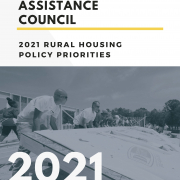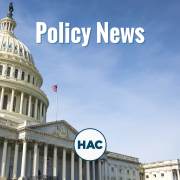HAC’s 2021 Rural Housing Policy Priorities
Federal policy has an important and lasting impact on rural places. For nearly 50 years, the Housing Assistance Council (HAC) has been the voice for the poorest of the poor in the most rural places. Our deeply rooted work in communities across the country informs our research and drives our policy positions. Our independent and non-partisan work with members of Congress, federal agencies, affordable housing and community development organizations, and other stakeholders ensures the most vulnerable rural populations – especially those in high-needs regions like the Mississippi Delta, rural Appalachia, farmworker communities, the Southwest border colonias and Indian Country – have improved access to safe and affordable housing opportunities.

Rural America is home to about 20 percent of the U.S. population and covers more than 90 percent of the U.S. landmass. Its small towns and rural regions are diverse demographically and economically, and face a wide array of local challenges and opportunities for developing their communities and housing. While each place is unique, HAC has documented several themes. Persistent poverty is a predominantly rural condition. Habitable rural housing is in severely short supply. The adequate housing that does exist is often unaffordable because rural incomes are low and run well below the national median. Rural housing lacks adequate plumbing and kitchen facilities at a rate above the national average. Overcrowding is not uncommon in some rural regions. Decades of stagnant rural house prices have denied owners the wealth and mobility so often associated with buying a home. And racial inequity is endemic as the result of housing policies and banking practices that excluded rural people of color. Complicating these challenges, a lack of reliable rural data obscures rural realities.
In addressing these issues, HAC’s policy priorities include:
- Building the capacity of local affordable housing and community development organizations deeply rooted in rural places;
- Expanding access to credit and safe, affordable lending in underserved rural communities;
- Improving the overall quality, availability and affordability of housing to buy and rent in small towns and rural places; and
- Preserving, increasing and tailoring resources for federal affordable housing programs serving rural populations.
We invite you to view our 2021 Policy Priorities and explore the various policy issues facing rural communities.


